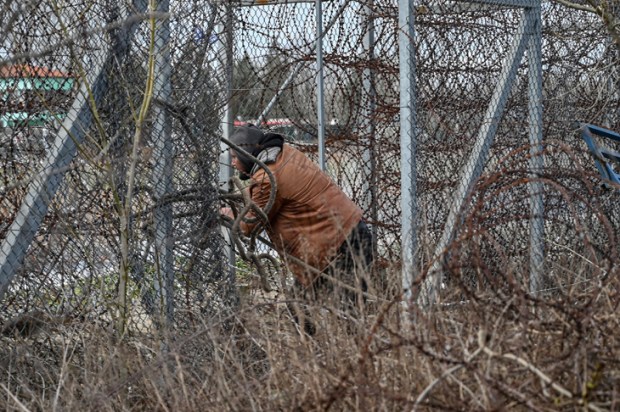Confessions of a Coronavirus vulture
The luckiest man in the world is a financier friend of mine who decided two weeks ago to wind up his hedge fund and retire (aged 50, the sod!). When he sold, the markets were about the highest they’ve ever been. By the following Monday, as the Coronavirus scare started to take hold, they’d tumbled 10 per cent; this week – thanks to the worst stock market collapse since the 2008 crash – those shares he offloaded at their peak are now worth peanuts. Don’t you wish you too could have been that jammy bastard?
Well I almost was. Not on the same scale, obviously. But I saw this ‘black swan’ event coming a mile off and I had a pretty good idea how to profit by it. All I had to do was liquidate my various funds and shares, hold them as cash until the market bottomed, and then buy them all back at half the price. Simultaneously, what I’d do is use my spread betting account to set up a series of punchy shorts and put options, secure in the knowledge that this was a one way bet because the markets were definitely going down. If I had played this one right – and I was definitely going to – I reckon I’d be up a good £100,000 by now, maybe more.
So how come I’m not now sunning myself on the next private Caribbean island to my hedge fund friend’s? Largely, mainly, because I’m a stupid bloody idiot. I’m feckless, flaky, disorganised, prone to procrastination, easily distracted. These flaws are not necessarily deal-breakers when you’re a freelance journalist. But if you want to make a killing out of trading stocks, they’re an absolute ruddy liability.
Let me first tell you how I foresaw the black swan event that so many others didn’t. It was a combination of two things. One was another friend of mine who happens to specialise in viral disasters (Ebola, etc). When everyone else was being sanguine and saying we’d seen it all before with swine flu and bird flu, my friend was saying: ‘No. This time really is different. It’s the big one!’ And when he told me the numbers, I trusted him.
The other took the form of daily bulletins from an expatriate friend in China, who gave me inside information on the horrors coming out of Wuhan. Many of the stories sounded so implausibly ghastly I took them with a pinch of salt: families being welded into their apartment buildings, like immured Medieval plague victims; elderly casualties being sent to the crematorium while still alive; recordings of a hospital receptionist explaining on the phone to someone pleading for admission that all the beds were full, all the doctors and nurses either sick or dead… Anecdotes, yes, but there were far too many of them, from too many sources, for it all to be a hoax.
That’s why I took precautions. First, I rang my parents and insisted they get up to date with their anti-pneumococcal shots. Then I did the same with my kids and brothers and sisters. I got lots of pushback and mockery for this on our family WhatsApp group. But that’s the thing about being ahead of the curve: you’d like to be respected as a visionary seer; you’re treated like a tiresome loon.
Not even the stock markets could see what was coming. Don’t the greedheads of the finance industry have algorithms and futurologists and richly rewarded tech graduates to predict this stuff? But nope, the markets remained unruffled, as did even those few investment journalists whose opinions I value. One or two mentioned Coronavirus as a potential issue – but only thence to dismiss it.
What I then belatedly realised is that what they say of Hollywood is also true of finance: nobody knows anything. The great investor Warren Buffett once demonstrated this via a $500,000 bet that the S&P 500 stock index – i.e. the average market performance – would do better than any five hedge funds anyone chose to name. Buffett won, proving that not even the richly rewarded Masters of the Universe can predict the future.
Yet here was I in possession of that magic ingredient – ‘edge’, inside information – which was going to generate my ‘alpha’. How come I didn’t use it? Well in fairness, I did get some of the way there. I went through my share portfolio, all £10,000 worth (I’m not a great saver), liquidated everything and put it into gold ETFs instead. What I didn’t get round to doing, though, was selling any of my fund holdings – like the Japanese one, which has now roughly halved in value. Nor did I set up any of those ingenious puts and other shorts, which would have made me thousands.
Naturally, over the last week or so I’ve had plenty of time to beat myself up and ask: ‘Why not, you great pillock? Why bloody not?’ And the answer is: a combination of stupid things. First I got a really nasty cold – you may mock, but if it wasn’t actual Coronavirus it jolly well felt like it – which knocked me sideways for a fortnight; then I wrote off my car. Plus, of course, I had my day job to do, churning out articles. And a wife and various demanding kids and pets to maintain. Then, when I had a desultory stab at opening what I laughably call my funds ‘portfolio’ online, I realised I’d forgotten the password which would have enabled me to sell them. My spreadbetting account, meanwhile, I had problems putting money in. And when I did look at put options, I found the process so complicated and mystifying and nerve-wracking (what if I confused my puts with my calls and ended up poorer?) I didn’t know what to do. I had the correct instincts in other words: just none of the skills. That’s the drawback when you’re a hack and not Gordon Gekko.
Still it’s not all bad. I do seem to have good instincts. My eldest boy Jim in Hong Kong has better tech skills than me and knows how to use an Etoro trading account. I told him a while back we should definitely short cruiselines, so he placed a very heavily leveraged bet for us both on Carnival. We’re up $10,000, so far.
Got something to add? Join the discussion and comment below.
Get 10 issues for just $10
Subscribe to The Spectator Australia today for the next 10 magazine issues, plus full online access, for just $10.
You might disagree with half of it, but you’ll enjoy reading all of it. Try your first month for free, then just $2 a week for the remainder of your first year.















Comments
Don't miss out
Join the conversation with other Spectator Australia readers. Subscribe to leave a comment.
SUBSCRIBEAlready a subscriber? Log in